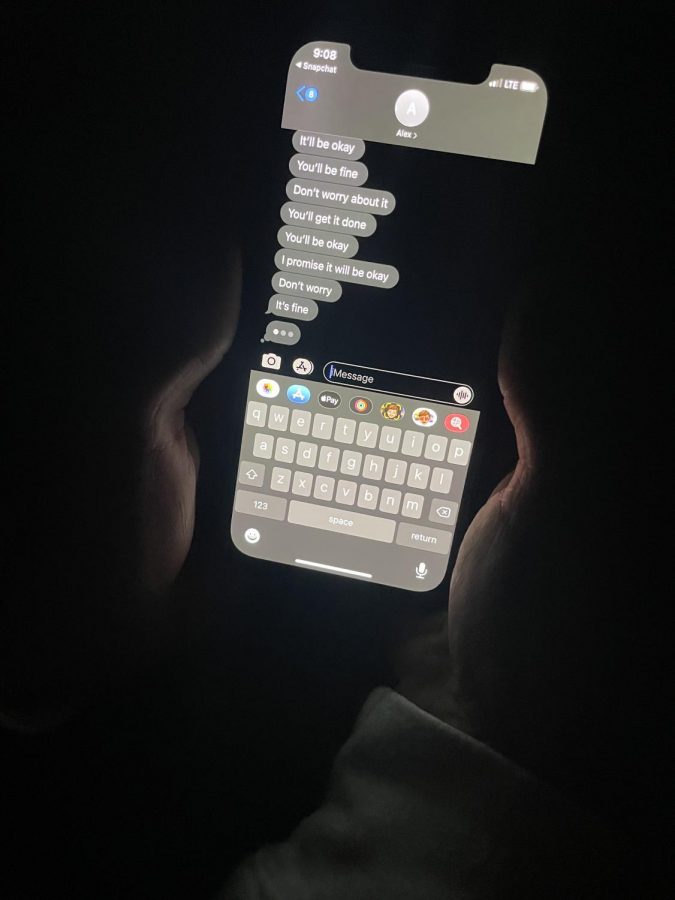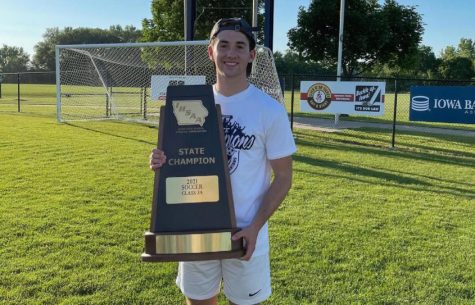The effects of toxic positivity in today’s society
Alex Hunter
Being a positive individual is tough. The concept is preached in schools, businesses and institutions all over the world. The pressure to conform to society’s push for positivity raises the question: are overly-optimistic people actually benefitting society, or have they created a pseudo-positive environment for their peers?
The idea of toxic positivity is a way of describing people who overuse optimism to hide the harsh reality of difficult situations. Whether it be at a stressful job or a high school auditorium filled with students people feel the crippling effects of high-stress environments. This natural coping mechanism of the brain cannot be resolved by saying “everything will be okay” or “you’re doing great.”
In a Health Line article, the negative effects of toxic positivity are described. “With toxic positivity, negative emotions are seen as inherently bad. Instead, positivity and happiness are compulsively pushed, and authentic human emotional experiences are denied, minimized, or invalidated,” it explained.
The expectation that everything will resolve itself is overused. In a more individualistic society, especially considering COVID-19, humans must be equipped with the ability to combat negative emotions while enduring great pressure and hardship. Simply putting self-care to the side will create a compound effect on people’s health.
Although being a happy person is important, society must understand how degrading toxic positivity can be. By spreading fake positivity, people begin judging themselves and each other for feeling pain, struggle and jealousy. This generates feelings of shame, inadequacy and weakness in the brain.
Social media has also played a vital role in the toxic positivity influx. Millions of teenagers online will comment on their peers’ photos preaching beauty and perfection, and the next day proceed to talk poorly about them at the lunch table. This second nature of toxic positivity is a direct result of the environment people place themselves in.
Paris Fietsam, Spartan graduate and social media influencer voiced her perspective on toxic positivity through social media.
“It is important to address some of these issues by reiterating the fact that only sincere positive comments should remain on a page and highlighting statements that stem from toxic positivity should go, but they are not easy to identify,” she said. “Toxic positivity can hurt someone’s feelings on social media because people get their hopes up about a positive comment and end up learning it is actually negatively affecting them.”
Technology’s dominance in recent years has enhanced the effects of toxic positivity in adolescents. On the contrary, teachers and other workers during the COVID pandemic experienced a wave of toxic positivity in the workplace like no other.
Peter Zucker, a PV and University of Iowa graduate described his experience with toxic positivity in the workplace during the COVID-19 pandemic. “Toxic positivity played a large role in my work experience. Beginning a new role in early 2021 with no option to work from home was quite a challenge,” he said. It caused much stress as I had to worry about endangering the health and safety of my friends and family and the false sense of hope from coworkers and administration only made it worse.”
The problem at hand has not improved much either. Zucker also added “[My bosses] also use the word ‘team’ a lot. Like ‘good morning team’, ‘great job team,’ attempting to make employees feel like they’re all in this together or they can all rely on each other in nearly impossible situations. It is simply unrealistic,” he said.
As more and more people resort to abusing toxic positivity, it is important to consider others’ emotions before trying to offer sugar-coated insight to them. Instead of masking yourself behind words of false hope, attempt to be more genuine. The more one relies on toxic positivity in their life, the harder it will be to stop. Resort to other acts of optimism before negatively affecting others.
A society crying for help: The lack of mental health resources in America
Brady Hunter
The COVID-19 pandemic has brought forth a plethora of negative psychological effects to American society, however, its toll on local mental health proves just as diminishing.
In the Quad Cities, both the availability and convenience of mental health resources have plummeted since the beginning of March 2020. As high school students attempt to tread through unfamiliar learning environments, there has been an upward trend of stress and anxiety in adolescents.
Alex Strauss, a Marlton psychiatrist who treats adolescents and adults, examined the lack of licensed therapists and psychologists in the United States. “Even before the pandemic, there was a significant lack of access to child mental health care. Lately, Strauss said, he’s received a 20 percent increase in calls from people asking for his help with “pandemic-related difficulties.” “With the need growing, it can be almost impossible to see someone now. There’s a severe national shortage of therapists,” Strauss claimed.
Consequently, students and young adults have taken therapy into their own hands to combat the mental health crisis. Reading self-help books, posting on social media and even partaking in illegal substances are all examples of how students are attempting to alleviate stress within their everyday lives.
According to New York University (NYU) publications, “People with anxiety and depression are more likely to report an increase in drinking during the COVID-19 pandemic than those without mental health issues.”
Additionally, Ariadna Capasso, a doctoral student at NYU School of Global Public Health, explained the correlation between alcohol and mental health. “This increase in drinking, particularly among people with anxiety and depression, is consistent with concerns that the pandemic may be triggering an epidemic of problematic alcohol use,” she said.
Due to general shortages at Genesis healthcare system, it may take an outpatient appointment three to four weeks to get scheduled with a licensed therapist. However, the largest predicament that behavioral clinics are facing is follow-up treatment. For example, a psychologist may want to see a patient twice a month but is only available once every three months.
Through a series of lockdowns and quarantines, American society lacks the mental stability to return to everyday life. In need of mental health resources to counter the COVID-19 pandemic, Americans continue attempting self-treatment to reduce common symptoms of mental health conditions.











